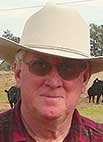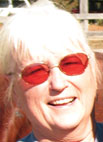
Involvement in agriculture didn't fall that far from the Alstadt's tree. John Alstadt's grandfather worked for the USDA. “My grandfather in Texas had an Angus herd my whole life. That’s why we chose Angus. My brother and I grew up showing cattle, but we had no real experience with the business and day-to-day aspects of farming," he said.
When they decided to move to Arkansas and farm, the Alstadts relied on family and expert experience. "Our Extension agent helped us a lot. I think he took an interest in us because we were these city kids and he made sure that we were included,” said Camille.
John and Camille Alstadt lived in Dallas, Texas for 20 years. “We bought this place in 1990 as a place to have for when we retire," said Camille of their 300-acre Oakdale Farm near Booneville, Ark. “But, we got tired of the city so we moved up here in October of 2000.”
John still works in Dallas every other week where he sells securities. Camille is currently V.P. of Marketing & Communications in the Arkansas Angus Association.
In the spring, the Asltadts bought eight cross bred heifers, then four more registered Angus heifers in the fall. We bought our first bull from Subiaco Abbey. “It was the first commercial bull that they ever sold. We relied on the help of Father David (a monk at Subiaco Abbey in Subiaco, Ark.) and Butch Geels, the farm manager at the Abbey. We just rode around with them for a whole day watching everything they did,” added John.
The Alstadt's herds are divided by age and function and are rotated throughout the year. “We have 200 acres up here and 100 acres are John's son’s. When we move the bull herd down to our son’s place we will be able to rotate our cows around a little better,” said Camille. She added that Jim Shook helps out with their buildings and fences and does a lot of the day-to-day work on the farm.
Right now the Alstadts have about 60 crossbred and 80 purebred mother cows. The crosses are used for recips or a small beef herd. “We sell steroid, hormone, antibiotic-free beef to the people at my office. There is more demand there than we can meet,” said John. “I feel good about providing families with something healthy to put on their table," said Camille.
“And they really like the taste," added John. “Everyone likes the steaks and everything but what people really rave about is how good the hamburger is.”
The purebred cows are an important part of the Alstadt’s seed stock operation. The couple explained that their immediate focus is refining their herd by strict culling criteria. The goal is to improve overall herd quality and efficiency.
“If a cow is not paying her way, she goes. Feed and fertilizer is too high to hang on to borderline cattle. Chip Moore, the farm manager, is helping us with that. It’s very hard sometimes; we know all our cow’s names, but we can’t have an inefficient cow,” she said, adding, "A cow’s job is ultimately to raise a bull that can go to a commercial herd somewhere. And Chip is helping us turn a big, giant hobby into a business.”
“We are doing embryo work and artificial insemination, and the cows that we cull are cows that are not doing what they need to,” explained John. They also have 30 Embryonic Transfer calves in Texas that will come here when they are weaned.
“When we go to sales we look for animals that will really improve our genetics. Chip is really adamant that we keep good maternal traits. We look at milk production, efficiency and how much the calf is going to wean. All of our animals are ultrasound tested so that we know what’s going on inside and outside," said Camille. These efforts will help grow the Alstadt's bull business, and maintain the quality characteristics of the herd these city-turned-country folks are working towards.







